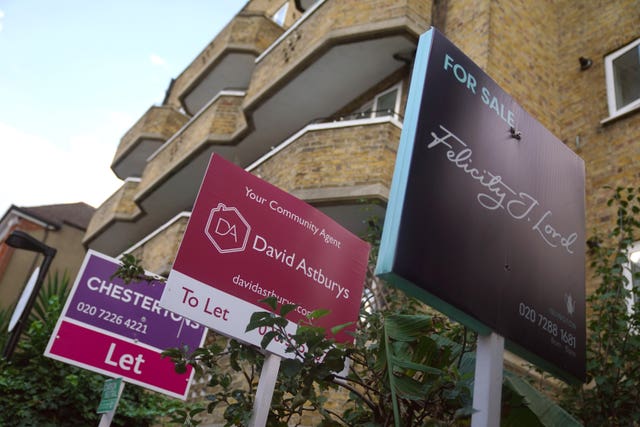Renters’ Bill aims to drive out disreputable landlords, says minister
A blanket ban on no-fault evictions is among the measures in legislation being introduced on Wednesday.

The Government will seek to “drive out disreputable landlords from the sector” with legislation being introduced on Wednesday, housing and planning minister Matthew Pennycook has said.
The Renters’ Rights Bill aims to “decisively level the playing field between landlords and tenants” but “good landlords have nothing to fear”, Mr Pennycook said.
The Government has confirmed the legislation includes a blanket ban on no-fault evictions under section 21, which allows landlords to evict tenants with two months’ notice without providing a reason.
This means that landlords will not be able to “arbitrarily evict any tenant with a section 21 notice, including tenants that make complaints about things like damp and mould, rather than fix those problems”, Mr Pennycook told LBC.
He said: “We want to drive out disreputable landlords from the sector, but good landlords through this Bill will have robust grounds for possession when they need to take their properties back.”

The Conservatives’ Renters (Reform) Bill then ran out of time to progress through Parliament before the election.
The new Government said it will go further than previously proposed by banning section 21 evictions for both new and existing tenancies, with research by charity Shelter finding 26,000 households have been evicted by bailiffs as a result of section 21 proceedings since 2019.
Landlords can apply for an accelerated possession order if the tenants have not left by the date specified in a Section 21 notice.
There were 2,916 such repossessions between April and June this year, an increase of 31% on the same period last year and the highest quarterly figure since the beginning of 2018.
If the changes prompt some landlords to sell their buy-to-let properties, this could open up space for professional private rental providers to come into the sector and “drive some improvement for tenants” rather than reduce overall rental stock, Mr Pennycook said.
He said the Government wants to see more build-to-rent housing offered by professional providers.
There will likely be an increase in the number of tenants who take their landlords to tribunals, for example to challenge mid-tenancy rent hikes, and Mr Pennycook said he is working with the Ministry of Justice to ensure courts are prepared.
He said: “We want a proportion of tenants to go to the tribunal because it will have a sort of public interest role in benchmarking what is the reasonable rent increase in any area but… we don’t want a system where the tribunals are swamped.”
The Bill will also extend Awaab’s Law – named after the toddler who died after exposure to mould in his family’s social rented home – to the private sector to ensure all landlords speedily address hazards and make homes safe.
Blanket bans imposed by some landlords on those receiving benefits or with children would end under the proposed legislation.
A Decent Homes Standard will be applied to the private rented sector for the first time, with the Government highlighting that 21% of privately rented homes are currently classified as “non-decent” and more than 500,000 contain the most serious hazards.
The reforms also crack down on bidding wars between potential tenants with a legal requirement for landlords and letting agents to publish the required rent for a property.
Landlords and agents will be banned from “asking for, encouraging, or accepting any bids” above the publicly stated price.

The Bill would also ban rent increases being written into contracts to prevent mid-tenancy hikes, leaving landlords only able to raise rent once a year at the market rate.
It will create a new private rented sector database to clarify landlords’ obligations, enable tenants to make informed choices and improve councils’ enforcement.
Big Issue founder and peer Lord Bird, welcomed the Bill but said it is not a “golden bullet for renters’ rights”, arguing it does not deal with “spiralling cost” of tenancies.
He called on the Government to “stand firm behind their promises and not bow to pressure from the landlord lobby.”
Polly Neate, Shelter chief executive, said section 21 “has haunted England’s renters for years” and “11 million of them will breathe a sigh of relief when these unjust evictions are finally consigned to the history books”.
She added: “The Renters’ Rights Bill must be a fresh start to fix private renting. With notice periods so short and more than 60,000 renters forced out of their homes by rent hikes in the past year alone, renters will expect bold action to deliver the security they’ve long been promised – no ifs, no buts.”
He added the end of section 21 evictions “represents the biggest change to the sector for over 30 years” and “sufficient time” will be needed for the sector to prepare.
Mr Beadle said: “Over 4.5 million households will need tenancy agreements updating, letting agent staff and landlords will need to undertake training and insurance and mortgage providers will need to adjust policies and rates.
“None of this will happen overnight and the Government needs to publish guidance.
“In addition, ending section 21 will leave the courts needing to hear possession claims where landlords have a legitimate reason.
“The cross-party Housing Select Committee has warned that without reforms to ensure the courts process cases much more swiftly, they risk becoming overwhelmed. This will not serve the interests of tenants or landlords seeking justice.”
He added that the NRLA supports measures to ensure every rental home is of a decent standard, but warned the changes need to be backed by “robust” enforcement by councils.
A Conservative spokesperson said: “Conservatives believe in ensuring choice and freedom, whatever home they live in.
“But new regulation must be necessary and proportionate.
“Otherwise, as it has in Scotland, badly drafted laws will cut supply, forcing up rents and reducing choice for renters.
“We await to see the details of Labour’s proposals and hope they are more coherent and thought-through than their interventions in other policy areas so far.”





